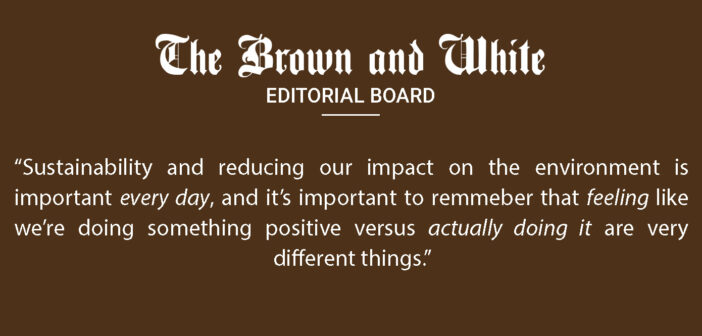Every year, Earth Day stimulates discussions about climate change, sustainable practices for individuals or institutions and about how grateful we should be to live on such a lush and environmentally diverse planet.
Lehigh’s Sustainability Strategic Plan 2030 is Lehigh’s newest official plan to encourage sustainable practices on campus.
One part of this plan is an effort to transition Lehigh’s buses from diesel to electric. Lehigh has already begun testing electric buses to navigate our campus’s difficult terrain and we applaud this proactivity in tackling this challenging issue by 2030.
In another example to encourage sustainable practice, the Office of Sustainability and the campus bookstore launched EcoCoin this year, a program where students can choose to skip a plastic bag in order to donate a small amount to a student organization.
Another difficult topic that comes up in many discussions of sustainability is the role individual responsibility plays in encouraging positive behavior, particularly as it relates to the responsibilities of the corporations and manufacturers that have done many times the harm to the environment that any individual could do.
This conversation is most perfectly represented by the national discussion surrounding plastic straws which began years ago in response to a video of a sea turtle with a piece of a single-use straw stuck in its nose.
When Starbucks announced its goal to eliminate plastic straws completely by 2020, it became popular to be wary of plastic straw use and alternatives (some good, some annoying and soggy) became more highly used.
Of course, Earth Day is not a purely positive and constructive experience — there are ways in which we believe people approach it poorly and there is always more Lehigh can do to help achieve our goals for campus sustainability.
One thing we can’t help but notice is a certain amount of predictable performativity occurring on Earth Day. Some are prone to quickly flock to Instagram and post a story about how much they love our planet — infographics about carbon emissions or recycling are popular in those 24 hours before many of these issues are quickly forgotten again.
Sustainability and reducing our impact on the environment is important every day, and it’s important to remember that feeling like we’re doing something positive versus actually doing it are very different things.
Some people believe in the efficacy and responsibility we have to be aware of these issues and take small steps to help correct them. Others believe individual grassroots efforts only serve to make us feel that we’re making progress toward a healthy environment while the bigger issue of corporations exacerbates climate change and carbon emissions at an unrelenting pace.
We believe concrete actions taken by individuals and encouraging corporations to be accountable for their negative environmental impact can coexist. We acknowledge what we can do, but at the same time we demand the most egregious offenders do the same.
In the case of straws, although plastic can be legitimately malicious to turtles and other animals, most of the strength of the movement came from having people begin to think of environmental issues that are a direct result of individual human behavior.
One thing we believe the community could do better is actually something we believe almost everyone could do better: recycling.
When people recycle something that should not be recycled (like a greasy pizza box or an improper kind of plastic), the entire recycling bin may be spoiled and none of it can be recycled at all.
Thus, we as a country and community clearly lack the knowledge or effort of recycling that is needed to do it properly.
Other small fixes Lehigh could make are changing the fact that many buildings’ lights remain on throughout the night, regardless of whether students are in them, along with sparingly printing paper or doing so more efficiently.
This Earth Day was and continues to be a chance to celebrate our planet. Talk about how much you love it. But make sure that love spreads to the rest of the days in the year. Acknowledge the ways in which you can help and do it — keep yourself and your community accountable.






Comment policy
Comments posted to The Brown and White website are reviewed by a moderator before being approved. Incendiary speech or harassing language, including comments targeted at individuals, may be deemed unacceptable and not published. Spam and other soliciting will also be declined.
The Brown and White also reserves the right to not publish entirely anonymous comments.